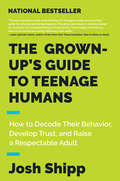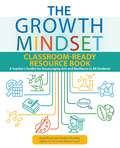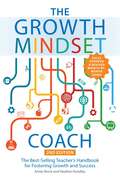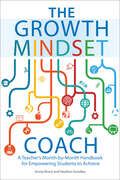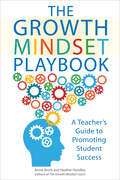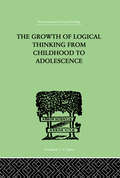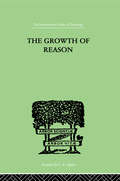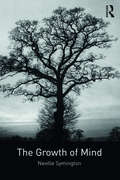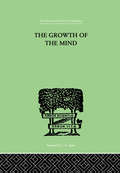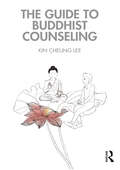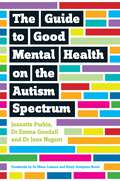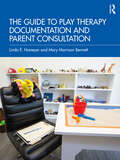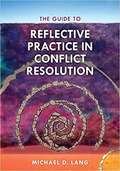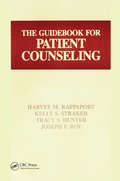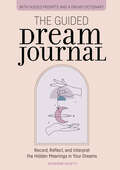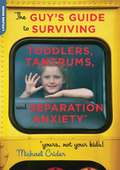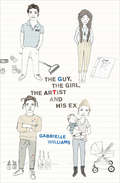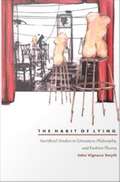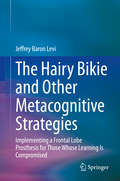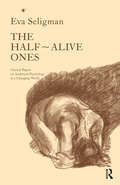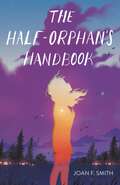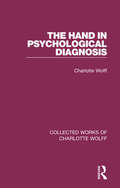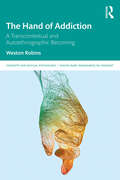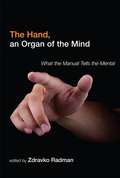- Table View
- List View
The Grown-Up's Guide to Teenage Humans: How to Decode Their Behavior, Develop Unshakable Trust, and Raise a Respectable Adult
by Josh ShippA practical guide to understanding teens from bestselling author and global youth advocate Josh Shipp.In 2015, Harvard researchers found that every child who does well in the face of adversity has had at least one stable and committed relationship with a supportive adult. But Josh Shipp didn’t need Harvard to know that. Once an at-risk foster kid, he was headed straight for trouble until he met the man who changed his life: Rodney, the foster parent who refused to quit on Shipp and got him to believe in himself. Now, in The Grown-Up’s Guide to Teenage Humans, Shipp shows all of us how to be that caring adult in a teenager’s life. Stressing the need for compassion, trust, and encouragement, he breaks down the phases of a teenage human from sixth to twelfth grade, examining the changes, goals, and mentality of teenagers at each stage. Shipp offers revelatory stories that take us inside the teen brain, and shares wisdom from top professionals and the most expert grown-ups. He also includes practice scripts that address tough issues, including: FORGIVENESS: What do I do when a teen has been really hurt by someone and it’s not their fault?COMMUNICATION: How do I get a teen to talk to me? They just grunt.TRUST: My teen blew it. My trust is gone. Where do we go from here?BULLYING: Help! A teen (or their friend) is being harassed.DIFFICULT AND AWKWARD CONVERSATIONS: Drugs. Death. Sex. Oh my.Written in Shipp’s playfully authoritative, no-nonsense voice, The Grown-Up’s Guide to Teenage Humans tells his story and unpacks practical strategies that can make a difference. Ultimately, it's not about shortcuts or magic words—as Shipp reminds us, it’s about investing in kids and giving them the love, time, and support they need to thrive. And that means every kid is one caring adult away from being a success story.
The Growth Mindset Classroom-Ready Resource Book: A Teacher's Toolkit for For Encouraging Grit and Resilience in All Students (Growth Mindset For Teachers Ser.)
by Annie Brock Heather HundleySkip the late-night lesson planning and start stretching your students' minds with this practical, ready-to-use companion to the popular The Growth Mindset Coach series.Thanks to the revolutionary power of growth mindsets, teachers everywhere have been helping their students realize their boundless potential. However, with busy schedules and crowded classes, infusing growth mindset principles into your lessons every day is sometimes easier said than done. From the best-selling authors of The Growth Mindset Coach, this new book makes implementing mindset strategies easier than ever before. With over 50 ready-to-use resources all focused on fostering growth mindsets, The Growth Mindset Classroom-Ready Resource Book, is your new go-to teaching assistant. These resilient- and grit-building ideas include: - Interactive lesson plans - Creative conversation starters - Mindful reflection exercises - Classroom management strategies A perfect supplement for any teacher looking for additional support in banishing fixed mindsets and instilling a growth mindset culture in their classroom.
The Growth Mindset Coach, Second Edition: The Best-Selling Teacher's Handbook for Fostering Growth and Success (Fully Updated and Revised Month-by-Month Guide)
by Annie Brock Heather HundleyBring growth mindset strategies into the classroom with the newly updated version of this best-selling, easy-to-follow guide for teachers to empower learning through grit and resilience.The teacher-favorite The Growth Mindset Coach returns in a fully updated second edition, featuring fresh strategies, research, and resources to help unleash students&’ potential through innovative lessons, empowering messages, and cutting-edge teaching techniques. This new edition expands its focus to address the evolving needs of today&’s diverse classrooms, while incorporating the latest research and trends in education. The Growth Mindset Coach, Second Edition provides the tools and advice needed to foster a growth mindset classroom, including: A refreshed month-by-month program with adaptable lessons for middle and high school students Updated research-based activities from the latest studies New hands-on lesson plans incorporating social-emotional learning (SEL) concepts Fresh real-life educator stories reflecting today&’s classroom realities Constructive feedback techniques grounded in the latest psychological research Updated sample parent letters and communication techniques New content on AI as a teaching tool and how to embrace new classroom technology Studies show that growth mindsets result in higher test scores, improved grades, and more engaged students. When your students understand that their intelligence is not limited, they succeed like never before. With the tools in this book, you can motivate your students to believe in themselves and achieve anything.
The Growth Mindset Coach: A Teacher's Month-by-Month Handbook for Empowering Students to Achieve (Growth Mindset for Teachers)
by Annie Brock Heather HundleyBring growth mindset strategies into the classroom with this easy-to-follow guide for teachers to empower learning through grit and resilience Created by teachers for teachers, this is the ultimate guide for unleashing students&’ potential through creative lessons, empowering messages and innovative teaching. The Growth Mindset Coach provides all you need to foster a growth mindset classroom, including:A Month-by-Month ProgramResearch-Based ActivitiesHands-On Lesson PlansReal-Life Educator StoriesConstructive FeedbackSample Parent LettersStudies show that growth mindsets result in higher test scores, improved grades and more in-class involvement. When your students understand that their intelligence is not limited, they succeed like never before. With the tools in this book, you can motivate your students to believe in themselves and achieve anything.
The Growth Mindset Playbook: A Teacher's Guide to Promoting Student Success
by Annie Brock Heather HundleyDiscover effective and accessible tools for transforming your classroom and inspiring your students with this easy-to-use guide.Students who harness the power of growth mindset can succeed beyond their wildest imagination. The key is having a growth-mindset teacher who provides support, guidance, and encouragement. Packed with research-based teaching methods, this approachable guide for applying the growth mindset offers:• Tips for overcoming challenges• Strategies for inspiring students• Ideas for constructive feedback• Techniques for improving communication• Examples of engaging lesson plansThe follow-up to the bestselling The Growth Mindset Coach, this expert handbook highlights several best practices for helping students realize their potential, explore new opportunities, and succeed socially and academically.
The Growth Of Logical Thinking From Childhood To Adolescence: AN ESSAY ON THE CONSTRUCTION OF FORMAL OPERATIONAL STRUCTURES (International Library Of Psychology Ser.)
by Piaget, Jean & Inhelder, BrbelThis is Volume XXII of thirty-two on a series of Developmental Psychology. Originally published in 1958, this text offers a translation from French of an essay on the construction of formal operational structures to explain part of the growth of logic in a child's brain and development. It looks at propositional logic, the integration of formal thought and the operational schemata of formal logic.
The Growth Of Reason: A STUDY OF the Role of Verbal Activity in the Growth of the (International Library Of Psychology Ser.)
by Lorimer, FrankFirst Published in 1999. Routledge is an imprint of Taylor & Francis, an informa company.
The Growth of Mind
by Neville SymingtonThe Growth of Mind is the product of a series of ten lectures by Neville Symington. It offers an understanding of the mind and its capacity to discover truth, establishing this as the foundation stone for our judgment and critique of the human world. Although the book’s field of exploration lies in psychological processes met in the consulting-room, grounded in the general principles of psycho-analysis, the book’s mode of enquiry is to elucidate a knowledge of individual people. Exploring the mind’s active role in understanding, the book suggests that the act of understanding has a transformative function, and that to be a person is to be a part of a community. It suggests that the super-ego is a sign of some undeveloped function within the personality. If the ego and all its functions are fully evolved, then the super-ego will only be minimally present in the personality. Symington posits that the unconscious represents an agglomerative mass in an undifferentiated and indistinguishable state, rather than a realm of distinguishable thoughts or feelings that are not currently present to consciousness. The book attempts to understand better what this unconscious state is like and how we can think about it, underpinned by the belief that the better we understand it, the more its structure changes. The Growth of Mind is aimed at professionals and researchers who have a basic understanding of the mind and its mode of operating. It will help readers become aware of this knowledge, strengthening it in the process and allowing it to become a foundational source of inspiration.
The Growth of the Mind: An Introduction to Child-Psychology (International Library Of Psychology Ser.)
by K. KoffkaFirst Published in 1999. Routledge is an imprint of Taylor & Francis, an informa company.
The Growth of the Mind: And the Endangered Origins of Intelligence
by Stanley I. GreenspanA short description of how the mind works and how intelligence can be defined.
The Guide to Buddhist Counseling
by Kin Cheung LeeBuddhist concepts and practices have become increasingly popular and integrated into professional psychology. This book is the first to propose a theoretical orientation for counseling based on Early Buddhist teaching, and introduce it to counseling professionals for use in mental health treatment and practice. Lee begins his book by outlining the essential concepts required to understand the Buddhist view of human nature and the world. He presents the Buddhist counseling model and suggests practices for the spiritual advancement of counselors, including self-cultivation plans, contemplative exercises, and different types of meditation. Lastly, he discusses how to apply the model in assessment, conceptualization, and intervention, and uses several case examples to illustrate the actual process. As a go-to book in Buddhist counseling, this book is a valuable resource for Buddhist chaplains, counselors, and mental health professionals interested in using Buddhism in their clinical practice, as well as graduate students in religious studies and counseling.
The Guide to Good Mental Health on the Autism Spectrum
by Jeanette Purkis Wenn B. Lawson Emma Goodall Kirsty Dempster-Rivett Jane NugentFilled with strategies and advice, this empowering guide presents practical ways to improve the mental wellbeing of people on the Autism Spectrum. This helpful guide focusses on the specific difficulties that can arise for people on the autism spectrum who may also experience a mental illness. The book includes information on common mental health issues, such as depression and anxiety, as well as strategies for improving sleep patterns and mindfulness. Providing guidance on the benefits and drawbacks of therapy pets, medication, and psychotherapy, the authors offer balanced perspectives on treatment options and introduce self-help strategies tailored to meet your needs and improve your mental wellbeing. A number of short personal narratives from people on the autism spectrum and mental health issues illustrate the text. The book also includes a list of resources, books and organisations that can provide further support and inspiration.
The Guide to Play Therapy Documentation and Parent Consultation
by Linda E. Homeyer Mary Morrison BennettThe Guide to Play Therapy Documentation and Parent Consultation guides play therapists through the case-documentation process, from the initial inquiry for services through intake session, diagnosis, treatment planning, session notes, and termination summary. There’s a special focus on writing session notes, one of the areas in which play therapists most often request additional training. Chapters also identify play themes, explore clinical theories and case conceptualization, and guide play therapists from the playroom to the paperwork. The authors include several examples of case notes and treatment plans completed from a variety of theoretical perspectives, and vignettes and case studies illustrate ways to connect with caregivers, strategies for working with challenging caregivers, addressing difficult topics at different ages and stages of parenting (how to talk about sex, screen time, co-parenting, etc.), and much more. The book also includes a thorough discussion of ways to structure parent consultations to facilitate the therapeutic process. Expansive appendices provide many case examples and tips to explain and demonstrate documentation, and the authors provide form templates in the text and on the book’s website.
The Guide to Reflective Practice in Conflict Resolution
by Michael D. LangThis book is a commonsense guide to becoming a reflective practitioner, written by a practitioner for practitioners. Relying on actual practice situations, stories, and self-guided exercises, it responds to the questions: Why should professionals care about reflective practice? How do its principles and methods increase competence? What characteristics distinguish reflective practitioners? <P><P> Every person in a conflict resolution process sees the world differently and acts in a distinctive manner. Yet, by following well-developed practice routines, practitioners often fail to consider the unpredictability of human interactions and overlook behaviors that are inconsistent with their expectations. To respond effectively to surprising and unpredictable events, this book encourages practitioners to adapt their thinking, so they can use their knowledge and skills when situations do not match their assumptions or are inconsistent with their practice routines.
The Guidebook for Patient Counseling
by Tracey S. HunterThis book presents the skills pharmacists need to step out from behind the counter and counsel patients. It is designed to assist practitioners to fully comply with the professional and legal requirements for patient counseling.
The Guided Dream Journal: Record, Reflect, and Interpret the Hidden Meanings in Your Dreams
by Katherine OlivettiTap into the wisdom of your dreams and apply their lessons to your life Dreams are an invaluable window into our lives. They can lead to a burst of creativity, shed light on a challenging relationship, or reveal a deeper understanding of a difficult situation. Your dreams often know you better than you know yourself. The Guided Dream Journal will help you learn how to keep a dream journal and work with your dreams. This engaging journal helps you record, explore, and reflect on the themes and symbols that appear in your nightly visions. From helping you remember a long-forgotten memory to solving a seemingly impossible problem, there are so many answers in our dreams that can help us understand our waking life—learn how to interpret them. The Guided Dream Journal includes: Dream variety—Learn about the different types of dreams like lucid, recurring, nightmares, and others, and discover how knowing the storyline, pattern, and genre of your dream can help you determine its deeper meaning. Dream escort—Supportive prompts show you how to pinpoint signs, track insights, and keep a record of your breakthroughs over time. In the know—Use the dream dictionary to better understand and interpret 100 of the most common symbols, settings, colors, animals, and more that show up in dreams. When you want to discover and understand the significance of your dreams, The Guided Dream Journal is your go-to resource.
The Guy's Guide to Surviving Toddlers, Tantrums, and Separation Anxiety (Yours, Not Your Kid's!)
by Michael R. CriderA hilarious sequel to Michael CriderOCOs popular book about becoming a father-a humorous look at the parental passage of becoming obsolete"
The Guy, the Girl, the Artist and His Ex
by Gabrielle WilliamsWhen one of the most famous paintings in the world is stolen, four young lives are changed, for four very different reasons. The Guy decides to have a house party while his parents are out of town. The Girl is adjusting to life in a new country. The Artist has discovered that forgery is a lucrative business. And his Ex, mother of his baby, is just trying to make ends meet. As Guy, a feckless high-school senior, plans the party of the year, Rafi worries about her mother, who is still grieving over the drowning death of Rafi’s little brother back in Bolivia and haunted by the specter of La Llorona, the weeping ghost who steals children. Meanwhile, Rafi’s uncle is an art dealer involved in a scheme to steal one of the most famous paintings in the world, but he needs the forgery skills of Luke, a talented artist who has just split up with his girlfriend, Penny, who wants nothing more than to get him back to be a proper father to Joshie, the baby Rafi babysits. Engaging, provocative, darkly humorous and fast-paced, with a shocking and near-tragic ending, when Rafi’s mother’s grief tips over into mental illness. Correlates to the Common Core State Standards in English Language Arts: CCSS.ELA-LITERACY.RL.6.3 Describe how a particular story's or drama's plot unfolds in a series of episodes as well as how the characters respond or change as the plot moves toward a resolution. CCSS.ELA-LITERACY.RL.6.6 Explain how an author develops the point of view of the narrator or speaker in a text.
The Habit of Lying: Sacrificial Studies in Literature, Philosophy, and Fashion Theory
by John Vignaux SmythLying appears to be ubiquitous, what Franz Kafka called "a universal principle"; yet, despite a number of recent books on the subject, it has been given comparatively little genuinely systematic attention by philosophers, social scientists, or even literary theorists. In The Habit of Lying John Vignaux Smyth examines three forms of falsification--lying, concealment, and fiction--and makes a strong critique of traditional approaches to each of them, and, above all, to the relations among them. With recourse to Rene Girard, Paul de Man, Theodor Adorno, Leo Strauss, and other theoreticians not usually considered together, Smyth arrives at some surprising conclusions about the connections between lying, mimesis, sacrifice, sadomasochism, and the sacred, among other central subjects. Arguing that the relation between lying and truthtelling has been characterized in the West by sharply sacrificial features, he begins with a critique of the philosophies of lying espoused by Kant and Sissela Bok, then concludes that the problem of truth and lies leads to the further problem of the relation between law and arbitrariness as well as to the relation between rationality and unanimity. Constructively criticizing the work of such philosophers as Bertrand Russell, Ludwig Wittgenstein, Richard Rorty, and Nelson Goodman, Smyth shows how these problems occur comparably in fiction theory and how Paul de Man's definition of fiction as arbitrariness finds confirmation in analytic philosophy. Through the novels of Defoe, Stendhal, and Beckett--with topics ranging from Defoe's treatment of lies, fiction, and obscenity to Beckett's treatment of the anus and the sacred--Smyth demonstrates how these texts generalize the issues of mendacity, concealment, and sacrificial arbitrariness in Girard's sense to almost every aspect of experience, fiction theory, and cultural life. The final section of the book, taking its cue from Shakespeare, elaborates a sacrificial view of the history of fashion and dress concealment.
The Hairy Bikie and Other Metacognitive Strategies: Implementing a Frontal Lobe Prosthesis for Those Whose Learning Is Compromised
by Jeffrey Baron LeviThe book contains practical and innovative strategies to train clients with Traumatic Brain Injury, Autism, Intellectual Impairment and Behavioural Disorders to compensate for their deficits and to function independently within their environments. The book is a result of 30 years of working directly with clients who are experiencing problems with organization, memory, learning, problem solving and anger management. The book is highly recommended for practitioners working with clients with a range of disability in educational, community or work settings and is a valuable tool to researchers and tertiary institutions to impart this knowledge to future practitioners. The book is highly recommended to be included in a cognitive rehabilitation course for counsellors, neuropsychologists, rehabilitation consultants and vocational rehabilitation consultants. It would be highly relevant for a section in a Special Education course and for school psychologists, special education and mainstream teachers working with children with learning and behavioural disorders.
The Half-Alive Ones: Clinical Papers on Analytical Psychology in a Changing World
by Eva SeligmanThe Half-Alive Ones consists of nine clinical papers and two more theoretical ones. It celebrates almost fifty years of therapeutic work, depicting some of the author's most poignant professional experiences, both personal and collective. The author sees herself as an eclectic Jungian, with a flexible approach to analysis and therapy, revealed in her case studies, which demonstrate that the author rarely works with a single person who is ill by himself. She finds it more fruitful to perceive him and to treat him as part of a total situation, which he brings into the consulting room: his family of origin, his work situation, and part or current significant relationships. The author attempts to confirm her deep-felt belief that good listening, sensitive timing, versatility, and evaluation of the other's truth, are indispensable ingredients of every therapeutic hour. Analysis is but an arid endeavour without compassion and creativity.
The Half-Orphan's Handbook
by Joan F. SmithFor fans of John Green and Emily X.R. Pan, The Half-Orphan's Handbook by Joan F. Smith is a coming-of-age story and an empathetic, authentic exploration of grief with a sharp sense of humor and a big heart.It’s been three months since Lila lost her father to suicide. Since then, she’s learned to protect herself from pain by following two unbreakable rules: 1. The only people who can truly hurt you are the ones you love. Therefore, love no one. 2. Stay away from liars. Liars are the worst.But when Lila’s mother sends her to a summer-long grief camp, it’s suddenly harder for Lila to follow these rules. Potential new friends and an unexpected crush threaten to drag her back into life for the first time since her dad’s death.On top of everything, there’s more about what happened that Lila doesn’t know, and facing the truth about her family will be the hardest part of learning how a broken heart can love again.An Imprint Book
The Hand in Psychological Diagnosis (Collected Works of Charlotte Wolff #3)
by Charlotte WolffOriginally published in 1951, this title looks at the study of the hand in relation to psychological diagnosis. This was at the time a new branch of psychology and the author is keen to point out it must not be viewed as perfect or indeed complete. Practical experience and a deeper understanding of psycho-motor phenomena had altered some of the author’s theoretical views since the earlier titles. This book builds on and extends her previous research, including new research studies particularly on children who were at the time termed ‘mentally defective’. It was designed to contribute some new diagnostic possibilities to psychology and psychiatry. Today we can enjoy it as part of psychology’s history.
The Hand of Addiction: A Transcontextual and Autoethnographic Becoming (ISSN)
by Weston RobinsThe Hand of Addiction maps out addiction from an innovative and holistic perspective, challenging the pervasive discourses surrounding addiction in many fields. Using the metaphor of a hand, the author examines addiction through five conceptual lenses—biomedical, psychological, sociocultural, developmental, and spiritual.The book successfully integrates Gregory Bateson’s understanding of the human hand, and further extends it to the study of addiction, studying the relationships between the different fingers (lenses) to reveal how the study of addiction so far has been myopic and compartmentalized. Using an autoethnographic approach, the author constructs a transcontextual mapping of the potential of addiction, and challenges what we claim to know about addiction, aiming to understand addiction from a novel perspective. The book also discusses practical strategies that can be used to support those with addiction in various forms.An important contribution to the literature on addiction studies, this book will be of great interest to academics and postgraduate students in the fields of psychology, sociology, cultural studies and other related disciplines. It will also be relevant for those interested in the philosophy and ethnography of addiction or those working in mental health.
The Hand, an Organ of the Mind
by Zdravko RadmanCartesian-inspired dualism enforces a theoretical distinction between the motor and the cognitive and locates the mental exclusively in the head. This collection, focusing on the hand, challenges this dichotomy, offering theoretical and empirical perspectives on the interconnectedness and interdependence of the manual and mental. The contributors explore the possibility that the hand, far from being the merely mechanical executor of preconceived mental plans, possesses its own know-how, enabling "enhanded" beings to navigate the natural, social, and cultural world without engaging propositional thought, consciousness, and deliberation. The contributors consider not only broad philosophical questions -- ranging from the nature of embodiment, enaction, and the extended mind to the phenomenology of agency -- but also such specific issues as touching, grasping, gesturing, sociality, and simulation. They show that the capacities of the hand include perception (on its own and in association with other modalities), action, (extended) cognition, social interaction, and communication. Taken together, their accounts offer a handbook of cutting-edge research exploring the ways that the manual shapes and reshapes the mental and creates conditions for embodied agents to act in the world.ContributorsMatteo Baccarini, Andrew J. Bremner, Massimiliano L. Cappuccio, Andy Clark, Jonathan Cole, Dorothy Cowie, Natalie Depraz, Rosalyn Driscoll, Harry Farmer, Shaun Gallagher, Nicholas P. Holmes, Daniel D. Hutto, Angelo Maravita, Filip Mattens, Richard Menary, Jesse J. Prinz, Zdravko Radman, Matthew Ratcliffe, Etiennne B. Roesch, Stephen V. Shepherd, Susan A. J. Stuart, Manos Tsakiris, Michael Wheeler
